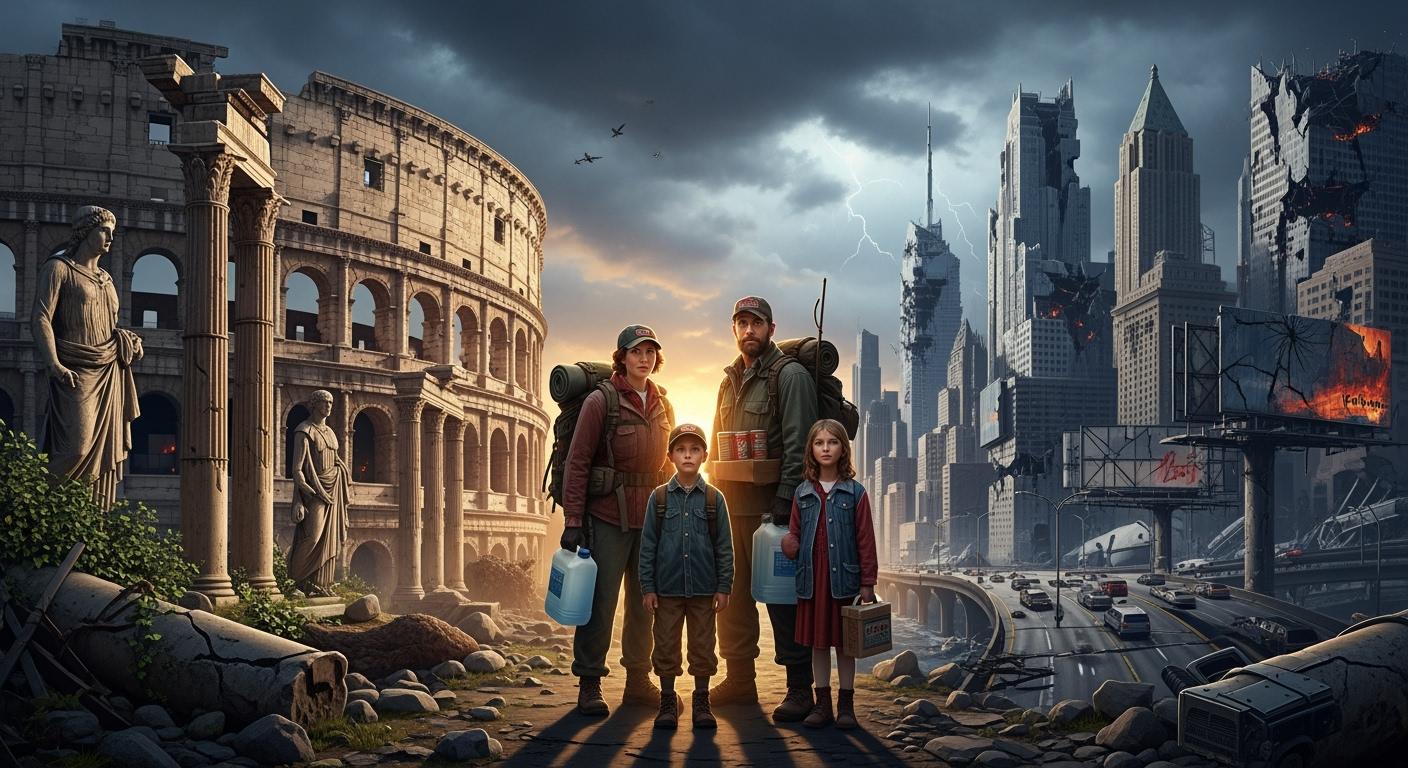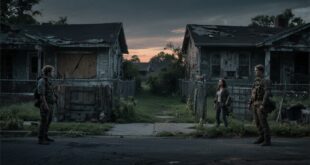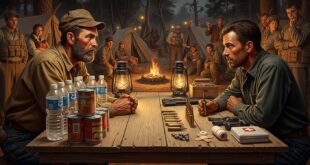Empires do not crash in a single afternoon. They thin out, they hollow from the inside, they change shape until one day the old name no longer fits what the thing has become. Rome teaches that lesson with relentless clarity and it matters for anyone trying to raise a family, build a small business, or set aside food and skills for hard times. If you want to understand what social decay looks like while it is happening, start with the empire that wrote the playbook.
The point of comparing Rome and America is not to claim that everything is identical. It is to identify recognizable patterns that show up when states overextend, elites fight for slices of a shrinking pie, currencies lose trust, borders blur, and public attention gets pacified by cheap entertainment while the real work of civic life goes undone. Those patterns show up in Roman sources and in modern data. The details differ and the stakes today are higher because everything is faster, bigger, and wired together.
If you care about preparedness, this is not a history hobby. It is a practical map. The map says to watch your money, your community, your supply lines, and your attention. It says to build household resilience before you need it. It says to study how the last republic fell into strongman politics and why people welcomed it. It says to keep your head when the circus gets louder.
“I’m going to argue that societies collapse from the same process by which they become complex. That complexity is the key driver that leads to collapse.”
Quote source: Reddit user

What actually happened to Rome
When people say Rome fell in 476, what they really mean is that the western emperor lost the title and the old central authority gave way to new powers that had already been running the show on the ground. The Visigoths sacked the city in 410, Odoacer deposed the young Romulus Augustulus in 476, and the wealthier eastern half carried on as the Byzantine Empire for centuries. The story is not a single date. It is a long slide punctuated by shocks.
A central chapter in that slide is the Crisis of the Third Century. Over roughly fifty years the empire was hammered by invasions, plagues, civil wars, and rapid turnover at the top. More than twenty emperors rose and fell in less than half a century. The state struggled to collect taxes, pay soldiers, maintain roads, and keep promises. This was not the end, but it bent the arc toward it.
Behind the battles lurked a quieter fracture. Trust in institutions thinned. People hedged. Local power brokers gained leverage while the center tried to hold everything together with decrees and edicts. When your daily life tells you that faraway officials cannot keep order or keep prices stable, you shift your loyalties to whoever can. That shift is how empires end in practice long before the textbook date.
“America can be taken down by three things. Climate, disease, and war.”
The forum user is blunt, maybe too blunt, but the spirit matches Roman reality. It was never one thing. It was everything all at once.
Money breaks trust before empires break apart
The Romans taught the world how to debase a currency. As state costs rose and revenue lagged, imperial mints lowered the silver content of coins. Under Septimius Severus the silver was already falling. Later coinage like the double denarius slid in purity and weight, and ordinary people felt it in prices and confidence. When money melts, social glue melts with it.
Modern governments do not clip coins. They print, borrow, and push debt forward. The Congressional Budget Office projects federal debt held by the public rising from around the size of the economy to far higher levels over coming decades if policy stays the same. That forecast is not politics. It is arithmetic. Debt service crowds out priorities. Perpetual deficits distort incentives. Families already understand this in their bones because the rules are the same at kitchen scale.
The lesson is not that America equals Rome. The lesson is that states that chronically spend more than they take in eventually face hard tradeoffs that no speech can wish away. In Rome, chronic debasement signaled that the promises of the center could no longer be kept without quietly taxing savings through inflation. In modern life, similar signals show up in deficit projections, rising interest costs, and a currency that buys less each year. The prudent response at household level is to hold some real goods, keep some savings outside of easy dilution, and build productive skills that hold value in any regime.
Borders, cohesion, and elite competition
Rome’s worst decades were not only about outsiders pressing the frontiers. They were about insiders clawing for power while ordinary people lost faith that the system worked for them. The third century featured repeated civil conflicts and a carousel of emperors. That churn is what happens when elite factions multiply faster than the available offices and spoils. The competition gets meaner as the pie stops growing.
Modern historians have formalized that pattern. Structural demographic theory, associated with Peter Turchin, argues that societies cycle through integrative and disintegrative phases driven by elite overproduction, mass immiseration, and state fiscal stress. In plain language, when you mint more credentialed elites than you have high status roles to satisfy them, you get strife at the top. When the state’s books worsen while ordinary people face stagnant prospects, you get unrest at the bottom. Put the two together and the center gets squeezed.
If you read Rome through that lens you can see the pressure building long before the barbarians step on stage. The warning for any large republic is that cohesion is a resource. It can be grown through shared sacrifice, family stability, fair rules, and local trust, or it can be traded for short term wins. When cohesion erodes, every other shock hits harder. The return on simple community habits suddenly looks enormous.
Bread and circuses then and now
The Latin phrase panem et circenses appears in Juvenal’s Satires. He mocked a public that had traded away its role in civic life for distractions and handouts. Later writers turned that line into a shorthand for how rulers pacify the people. The deeper point is not that bread is bad or that games are evil. It is that a population that forgets duty for diversion becomes easy to manage and easy to mislead.
Modern versions of bread and circuses are cheaper than ever. Screens glow all day. Entertainment is infinite. Subsidies and promises often arrive packaged with storylines that say your attention is owed to the next show, the next outrage, the next offer that costs nothing today and everything tomorrow. Juvenal’s jab still lands because it is about what people stop doing when they are fed and amused. Civic muscle atrophies if you never use it.
The takeaway for a household is simple. Starve the circus. Cut the noise. Grow the habits that keep a family grounded when the wider culture spins.
Overextension and the bill for policing the world
Rome’s borders were long and expensive. Defending them took men, money, and attention. Every fresh frontier invited a fresh fight. In our time the number of overseas commitments is different in kind but similar in effect. Researchers who track American basing point to hundreds of sites in scores of countries. Even the low counts are large. This is not an argument about whether any single base is wise. It is a sober reminder that the tab for global presence always comes due.
Big states can afford big roles until they cannot. Rome coped by squeezing provinces, shaving coinage, and conscripting labor. Modern states cope by running deficits and asking the next generation to pay. The cost of complexity shows up in maintenance work that gets deferred and in political fights about who must sacrifice to keep the machine running. The more sprawling the commitments, the more brittle the system becomes when a shock takes out one link.
For a family, the lesson is not isolation. It is realism. Maintain your own supply lines. Diversify income. Know the difference between needs and nice to haves. Build alliances with neighbors who care about order and mutual aid. A nation is stronger when its households are not dependent on every distant promise.
What this means for preppers and families now
Rome is a warning, not a prophecy. It does not mean America must collapse tomorrow, but it means that collapse is always on the table when nations trade discipline for decadence, stewardship for indulgence, and family strength for political gimmicks. The fall of Rome is a lesson book in slow decay, and it is worth reading carefully. For families who are serious about preparing, the message is simple: get your own house in order before the house of cards comes crashing down.
The first lesson is money. Rome debased its coins until people stopped trusting them, and once trust in money goes, trade itself begins to crumble. For the modern household, this means we must treat money we can hold as different from numbers in a digital account that can be frozen, inflated away, or redefined by bureaucrats. When you hold cash, gold, silver, or tangible goods, you are holding something that cannot be reprogrammed by a policy decision in Washington or manipulated by global bankers. Digital promises are fragile, but tangible value has a way of surviving storms. Every prepper should have a financial strategy that acknowledges this difference. It does not mean hoarding in fear, but it does mean keeping a portion of your wealth in forms that cannot vanish overnight with a market panic or political decree.
The second lesson is food and water. Rome’s collapse was marked by bread riots when the grain supply faltered. Even in the world’s greatest empire, when logistics broke, people went hungry. For today’s families, this means stocking food that you actually eat and rotate regularly. Do not waste money on cases of exotic survival rations that will make your children sick if you ever need them. Stock rice, beans, oats, pasta, canned meats, and preserved fruits and vegetables that are part of your real diet. Learn to can. Learn to dehydrate. Learn to rotate. And never forget water—without clean water, no prepper stash lasts more than a few days. Rain catchment, filtration, and stored reserves are not luxuries; they are lifelines. Rome fell slowly, but hunger always strikes fast. The families who endure are the families who prepare to feed themselves.
The third lesson is tools. Rome was full of men who could talk, flatter, and maneuver for office. But as the empire weakened, the men who could build, farm, forge, and defend became the backbone of survival. Skills outlast titles. For preppers, this is a direct call: choose skill over status. Learn trades that matter. Carpentry, mechanical repair, gardening, animal husbandry, first aid, and self-defense are all currencies that hold value no matter what flag flies above you. In a collapsing society, the college degree in fashionable theories will buy little, but the ability to fix a pump, grow food, or stitch a wound will buy survival. A country with a lot of skilled families is hard to collapse because it can regenerate from the ground up. That is why you should be investing in your family’s skillset today.
The fourth lesson is children. Rome’s citizens, distracted by circuses and handouts, raised generations without a sense of sacrifice or civic duty. That is why when the empire needed men willing to stand and fight, many were missing in action. The empire had to increasingly rely on foreign mercenaries who did not share Rome’s loyalty. The modern parallel is chilling. Families who raise children without God, without discipline, and without love of country are raising future dependents, not future defenders. Preppers must see beyond food and gear. The strongest preparation is raising children who are spiritually anchored, morally strong, and willing to take responsibility. Teach them Scripture. Teach them duty. Teach them that the family is the first line of defense against chaos. Teach them that faith in God is not an optional hobby but the only anchor in storms. A nation of grounded families will stand long after bureaucracies collapse.
The fifth lesson is institutions. Rome’s Senate and bureaucracy decayed into empty shells while local associations—guilds, churches, brotherhoods—carried real weight. In our time, we cannot afford to wait for Washington or any central authority to save us. We need to build small institutions that we can actually trust. This means churches that truly serve their flocks, not water down truth for applause. It means neighborhood watches that actually patrol, not sit idle. It means voluntary associations that meet regularly and know each other by name. It means small businesses that deliver on promises and neighbors who lend a hand without paperwork. These are the bones of any healthy society. If the center weakens, the places that still work will be the ones you built before the storm. If the supply chains snap, the families who knit together now will be the ones who keep lights on and children fed.
We should also remember that collapse does not come all at once. It comes in waves. Rome had moments of recovery, reform, and revival, but each time the revival was thinner than before. The lesson is that resilience must be continuous. Preppers should not think in terms of a single “Doomsday” but in terms of a drawn-out decay. That means preparing for rolling blackouts, inflation spikes, cyberattacks, epidemics, and social unrest as normal occurrences, not rare exceptions. When you can endure the small collapses, you are more likely to endure the big one. Prepping is not just a weekend hobby; it is a way of life that assumes the system will let you down at the worst possible time.
Faith must also be part of this preparation. Rome’s temples became hollow, its moral framework eroded, and its people increasingly lived for comfort instead of sacrifice. For America, that is the most dangerous parallel of all. A country without God, without moral compass, without belief in something greater than pleasure, will collapse from the inside no matter how strong its armies or markets. The prepper family should see faith as the cornerstone of resilience. Without it, all the beans, bullets, and bandages in the world will only buy you time. With faith, they buy you purpose and direction. Preparing without God leads to paranoia. Preparing with God leads to strength and peace.
Another practical lesson is to build networks of trust. In Rome’s decline, rural villas became centers of survival because they were self-sufficient and bound together by mutual loyalty. The same holds true today. If you are alone with your pantry and generator, you are vulnerable. If you are part of a network of families, each contributing skills and supplies, you are resilient. Build trust now while times are still relatively calm. Exchange labor with neighbors. Share skills with your church community. Train together. Plan together. A lone prepper is a target. A networked prepper is a pillar.
Finally, understand that collapse brings both danger and opportunity. Rome’s fall was brutal, but it also cleared space for new institutions, new nations, and new faiths to rise. Collapse is pruning. For families who prepare, collapse does not have to mean the end. It can mean the beginning of a new life built on stronger foundations. That is why we stock food, learn skills, raise children in faith, and build local trust. Not to hide, but to endure and rebuild. Preppers are not pessimists. They are realists who believe in planting seeds before the storm and harvesting after it passes.
The bottom line is this: America may not be Rome, but human nature has not changed. Debt, decadence, and distraction always rot the core of great nations. And strong, faithful families are always the antidote. Rome warns us not to assume that comfort lasts forever. Rome warns us that governments can and will fail. But Rome also teaches that households, churches, and communities who prepare wisely can carry civilization across the dark ages into whatever comes next. If you take those lessons seriously, you will not be caught off guard when the circus ends and the hard work of survival begins.
Frequently Asked Questions
| Question | Answer |
|---|---|
| Did Rome fall in a single day? | No. The decline stretched over centuries, with key shocks like the sack of Rome in 410 AD and the deposition of the last Western emperor in 476 AD. |
| What caused Rome’s decline? | A mix of debt, currency debasement, civil wars, overextension of borders, plagues, and social decay weakened the empire from within. |
| How is America similar to Rome? | Both expanded beyond sustainable limits, carried heavy debt loads, and experienced moral and cultural decline that weakened internal cohesion. |
| What does “bread and circuses” mean? | It refers to pacifying citizens with food and entertainment while ignoring civic duty, a criticism still relevant today in our screen-driven culture. |
| Did Rome’s currency collapse? | Yes. The silver content of coins was repeatedly reduced, fueling inflation and destroying trust in the state’s money. |
| What role did elites play in Rome’s decline? | Elite overproduction led to intense competition at the top, while ordinary people lost faith in government, fueling division and instability. |
| Can America avoid Rome’s fate? | Yes, but only if families and communities prioritize resilience, fiscal responsibility, and moral strength before crises hit full force. |
| What lessons should preppers take from Rome? | Stockpile essential goods, build local trust, cultivate real skills, and prepare for periods when central institutions may fail to deliver. |
| Was military overreach a factor in Rome’s fall? | Yes. Rome’s vast borders drained resources and forced the state to constantly spend beyond its means, much like modern global commitments today. |
| What can families do to prepare for collapse? | Build food stores, reduce debt, learn practical trades, strengthen faith and community ties, and minimize reliance on fragile systems. |
 Survive Our Collapse Building Self-Reliance in an Uncertain World
Survive Our Collapse Building Self-Reliance in an Uncertain World





California